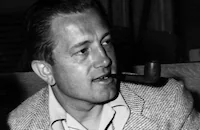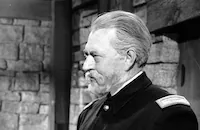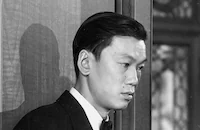The Left Hand of God

Brief Synopsis
Cast & Crew
Edward Dmytryk
Humphrey Bogart
Gene Tierney
Lee J. Cobb
Agnes Moorehead
E. G. Marshall
Film Details
Technical Specs

Synopsis
In 1947, American priest Peter John O'Shea makes the torturous journey to reach a Catholic mission in a remote province of China. O'Shea is nearly drowned and loses his possessions but finds the mission, where he is greeted by Dr. Dave Sigman and his wife Beryl, who, along with nurse Anne "Scotty" Scott, run the mission's hospital. Anne, who is Catholic, is thrilled about O'Shea's arrival, but the following morning, Sigman tells the priest that he thinks the mission should be closed. Sigman states that because O'Shea's predecessors died, the locals from the surrounding seven villages are reluctant to attend the church, and that pressure from warlord Mieh Yang makes the area too dangerous. O'Shea vaguely addresses Sigman's concerns, then goes to the nearest village with Anne, who is impressed by his respectful treatment of the village elder. Parishioner John Wong asks O'Shea to say Mass, but the priest protests that he cannot, as he has lost his vestments. John persuades O'Shea to preach, and on Sunday, the priest reads from a book of sermons. Anne, who has dresssed up for the occasion, shrugs off Beryl's supposition that she is attracted to O'Shea. At first, Anne is disappointed, but then smiles when the priest speaks in Chinese to the congregation and explains the lesson. After the service, however, a disreputable-looking stranger arrives, and when he spits at O'Shea's feet, the priest violently strikes him. Soon after, Anne attempts to comfort O'Shea, who is disappointed in himself for his lack of control. When O'Shea states that he wants to close the mission, Anne protests, asserting that he has accomplished a great deal of good. As they talk, Anne reveals that she came to China because her pilot husband crashed in the mountains during World War II, and she was hoping that he would be found. Having realized that her husband was dead, Anne stayed on, and has become dedicated to helping the poor villagers. Later, Beryl comments to Sigman about O'Shea's odd demeanor, claiming that there is something "wrong" about him. Sigman, who has warmed to the priest, despite O'Shea's inexplicable concern over the delay of the usual trade caravans, defends him, although he agrees that Anne, who is falling in love with O'Shea, should return to the United States. Concern for Anne prompts Beryl to approach O'Shea and suggest that he talk with a man who could understand what he is going through. O'Shea agrees and sets out for the Protestant mission of Reverend Thomas Marvin, which is several days away. Upon reaching the mission, O'Shea startles Marvin by revealing that he is not a priest, and that his name is actually James Carmody. Carmody relates that he was an American pilot during the war, and after being shot down three years earlier, was rescued by Yang. Although he was a virtual prisoner, Carmody served as Yang's second-in-command. Carmody then describes how he came to his present situation: One day, as Carmody leads a raiding expedition, he hears a shot from the scouting party ahead. When he rides up, Carmody sees that the insolent Pao-Ching, who is the stranger that came to the mission, has shot and wounded a priest. Carmody lashes Pao-Ching for disobeying his orders not to fire, then takes the priest to Yang's mountain fortress. Carmody and Yang engage in their customary crapshoot for Carmody's salary, after which Yang upbraids Carmody for reproving Pao-Ching and tells him that they will have to kill the priest. Word then comes that the priest, named Peter John O'Shea, has died, and Carmody goes to see Jan Teng, the Buddhist doctor who was tending to O'Shea. Knowing how desperately Carmody wishes to escape Yang, Teng hints that a man disguised as a priest could possibly elude Yang's spies. Carmody finishes his story by stating that he assumed O'Shea's identity and traveled to the mission in the hope of joining a trade caravan destined for the coast. Amazed, Marvin instructs Carmody to write to the bishop in Sinkiang, and urges him to return to the mission. Carmody demurs, insisting that he cannot carry on with the charade. As they are talking, the men receive word that Yang's men, alerted by Pao-Ching about Carmody's presence at the mission, are attacking the seven villages. Marvin again tells Carmody that "his" people need him, but the flyer refuses to don the priest's collar again. Soon after, terrified villagers attempt to flee but are stopped by Yang's soldiers, who begin mercilessly beating men and sending them to the mission in an attempt to provoke O'Shea into revealing himself. After three days, during which they are baffled by "O'Shea's" absence, Anne and Sigman are arguing when Carmody appears, again clothed as the priest. Without revealing his identity, Carmody continues to act as O'Shea and tells Sigman that the simple villagers could never outfight Yang's men. Carmody urges Sigman, Beryl and Anne to trust him, but soon the mission is overflowing with refugees. Determined to end the situation, Carmody meets with Yang alone. Carmody urges Yang to depart, and when Yang asks him to return to his service, Carmody proposes a game of dice to determine his fate. Yang agrees that if Carmody wins, he will leave the villages, the mission and the American alone, but that if he wins, Carmody must return with him for five years. Carmody acquiesces, and is deeply relieved when he wins. Yang then proposes to roll for the fate of the Protestant mission, wagered against three years of Carmody's life, and the American again wins. Yang sighs about the legends that will arise from his retreat, then warns Carmody that two priests from Sinkiang are coming. After Yang departs, Carmody returns to the mission and hears John telling a story about Carmody convincing Yang to leave by filling him with fear of the Holy Ghost. That night, Carmody tells Anne that he is an imposter, and she is relieved to learn that she had not fallen in love with a real priest. In the morning, Fathers Cornelius and Joseph Keller arrive and question Carmody about the letter he sent to the bishop, detailing his adventures. Cornelius doubts Carmody's sincerity because of the stories about the "miracle" of his defeat over Yang, and Carmody reveals that it all lay in the toss of the dice. Despite himself, Cornelius is impressed that Carmody was willing to risk five years of servitude in order to save the mission, and states that the bishop wants him to continue impersonating a priest and go to Sinkiang, where his punishment will be decided. Cornelius explains that as the parishioners have not been hurt by his imposture, it would only destroy their faith to learn the truth about their beloved "Shen-fu," the Chinese term for priest. The following day, Carmody bids farewell to John, Beryl, Sigman and his parishioners, while inside the mission, Anne tells Cornelius that despite his deception, Carmody was a good priest. Surprised by the devotion Carmody has inspired, Cornelius tells Anne the pilot's real name as they watch him ride away.

Director

Edward Dmytryk
Cast

Humphrey Bogart

Gene Tierney

Lee J. Cobb

Agnes Moorehead

E. G. Marshall

Jean Porter

Carl Benton Reid
Victor Sen Yung
Philip Ahn

Benson Fong
Richard Cutting
Leon Lontok
Don Forbes
Noel Toy
Peter Chong
Marie Tsien
Stephen Wong
George Chan
Walter Soo Hoo
Henry S. Quan
Doris Chung
Moy Ming
Stella Lynn

Robert Burton
Soo Young
Candace Lee
Kam Tong
Sammee Tong
Sophie Chin
George Lee
Beal Wong
Crew
Buddy Adler
Dr. Serge Bertenssen
Etter D'orazio
Ralph Dickey
Leonard Doss
Stephen Collins Foster
Eugene Grossman
Alfred Hayes
Dick Jensen
Ben Kadish
Ray Kellogg
Charles Lemaire
Harry M. Leonard
Ben Nye
Father Anthony O'doherty
Franz Planer
Edward B. Powell
Maurice Ransford
Ad Schaumer
Walter M. Scott
Anita Speer
Dorothy Spencer
Frank Tang
Travilla
Helen Turpin
Frank Wade
Henry Weinberger
Bernard Weisen
Lyle R. Wheeler
Victor Young

Videos
Movie Clip



Hosted Intro
Film Details
Technical Specs

Articles
The Left Hand of God
The screenplay (adapted by Alfred Hayes from the William E. Barrett novel) opens circa 1947 in the Chinese hinterlands, where an American priest (Bogart) answering to Peter John O'Shea has made the treacherous trek to a remote Catholic mission. It's there that he makes the acquaintance of Dr. Dave Sigman and their chief nurse, Anne Scott (Gene Tierney). The Sigmans apprise O'Shea that his responsibilities will be difficult, as the church's influence in the community has grown tenuous, and that the local populace lives in fear of the forces of regional warlord Mieh Yang (Lee J. Cobb).
The grim prospects don't daunt the newcomer priest, however, and he soon moves amongst the parishioners in Anne's company. The nurse is impressed with O'Shea's assured demeanor in relating with the Chinese faithful; however, her curiosity is piqued by his reluctance to perform standard sacramental duties. Further events transpire that make Anne certain that there is more to Father O'Shea than there seems - and that stir up feelings for the man that she knows are impossible to resolve.
On a pilgrimage to confer with Protestant missionary Thomas Marvin (Robert Burton), O'Shea confesses the truth of his situation. His real name is James Carmody, and he was a U.S. Army pilot shot down during WWII, rescued by Mieh Yang, and placed into forced servitude as the warlord's subordinate. When Yang's foot soldiers waylaid and killed the real O'Shea, Carmody found his long-sought chance for escape by stealing the dead man's vestments and identity. It all comes to unravel as Mieh Yang, tipped to the ruse, has his men attack the parish, and O'Shea/Carmody has to risk the safety of all on a desperate gambit.
Barrett's 1951 book had actually spent a few years being passed around by the studios, with William Faulkner having prepared a screen treatment at one juncture, and Kirk Douglas and Gregory Peck variously attached for the role of Carmody. Fox ultimately paid $110,000 for the rights to the novel and Faulkner's screenplay draft; they also had to promise that "O'Shea" would not be depicted performing any sacraments in order to comply with the Production Code.
Dmytryk (whose wife, onetime MGM contract ingénue Jean Porter, can be seen as Carmody's common-law bride) could see that Bogart was already in physical decline, which he reminisced about in his memoir It's a Hell of a Life but Not a Bad Living. "His chain smoking was really getting him down. Before the start of a scene, he would slip into a paroxysm of coughing that would elicit concern from almost every member of the crew. At one time or another, nearly every one on the set begged him to cut down on his smoking, but Bogey would just shrug his shoulders and light another cigarette." The director also noted how gamely Bogart, who had recently suffered a slipped disc, approached his requisite sequences on horseback.
For the beautiful and emotionally fragile Tierney, The Left Hand of God would be her last lead appearance in a Hollywood film. As she recounted in her autobiography Self-Portrait, finishing the shoot proved a struggle, and it was not lost on Bogart. "He recognized the signs, went to the studio bosses and warned them I was sick and needed help...They suggested Bogart be kind and gentle. He was nothing less. His patience and understanding carried me through the film."
Producer: Buddy Adler
Director: Edward Dmytryk
Screenplay: Alfred Hayes; William E. Barrett (novel "The Left Hand of God")
Cinematography: Franz Planer
Art Direction: Maurice Ransford, Lyle R. Wheeler
Music: Victor Young
Film Editing: Dorothy Spencer
Cast: Humphrey Bogart (James 'Jim' Carmody), Gene Tierney (Anne 'Scotty' Scott), Lee J. Cobb (Mieh Yang), Agnes Moorehead (Beryl Sigman), E.G. Marshall (Dr. David Sigman), Jean Porter (Mary Yin), Carl Benton Reid (Father Cornelius - bishop's envoy), Victor Sen Yung (John Wong - church sexton), Philip Ahn (Jan Teng - Buddhist priest).
C-87m. Letterboxed. Closed Captioning.
by Jay S. Steinberg

The Left Hand of God
Quotes
Trivia
Notes
William E. Barrett's novel first appeared as a serial in Redbook magazine (Jul 1950-October 1950). According to a January 21, 1951 Hollywood Reporter news item, the screen rights to Barrett's novel were originally acquired by Howard Hawks and Edward Lasker for their independent company Winchester Productions. A April 1, 1951 New York Times article reported that Hawks and Lasker were producing the project for RKO, with a screenplay written by William Faulkner. In June 1951, Los Angeles Times noted that Kirk Douglas was set to star. Twentieth Century-Fox purchased the property in early 1954, and a modern source adds that the studio paid $110,000 for Faulkner's screenplay and the rights to the novel. The extent of Faulkner's contribution to the completed picture has not been determined, however. Several contemporary sources noted that it was difficult to adapt the book for the screen due to censorship concerns about the consequences of a layman impersonating a priest. In order to gain approval from the PCA, the studio decided that "James Carmody" would not be shown hearing confessions, saying Mass or carrying out any duty that would be considered sacreligious if performed by anyone other than a priest.
In August and September 1954,Hollywood Reporter news items noted Gregory Peck was set to star in the film. When Humphrey Bogart was signed for the role of Carmody, his contract called for "a participation arrangement under which [he] gets ten percent of the distribution gross," according to a December 30, 1954 Hollywood Reporter news item. Dona Drake was tested for the picture, according to a March 15, 1955 Hollywood Reporter news item, but her appearance in the released film has not been confirmed. Hollywood Reporter items also relate that backgrounds for the picture were shot on location in Hong Kong, and that location shooting was done at the Twentieth Century-Fox Ranch in Malibu, CA.
The film's September 21, 1955 premiere in New York was a benefit for The Boys Towns of Italy. The picture marked the last starring screen appearance of actress Gene Tierney (1920-1991). Tierney, who had been under contract to Twentieth Century-Fox since 1940, had been suffering from mental illness for a number of years and entered a series of sanitoriums for treatment. In her autobiography, Tierney noted that Bogart, whose sister was also mentally ill, was extremely supportive of her during filming. After marrying Houston oilman Howard Lee in 1960, Tierney retired to Texas, but occasionally returned to Hollywood for TV and films, beginning with the 1962 production Advise and Consent (see AFI Catalog of Feature Films, 1961-70).

Miscellaneous Notes
Released in United States Fall September 1955
Released in United States Fall September 1955














